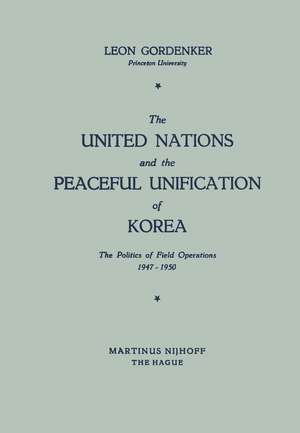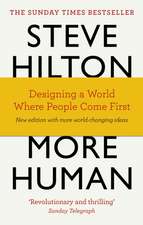The United Nations and the Peaceful Unification of Korea: The Politics of Field Operations, 1947–1950
Autor Leon Gordenkeren Limba Engleză Paperback – 1959
Preț: 392.60 lei
Nou
Puncte Express: 589
Preț estimativ în valută:
75.12€ • 78.43$ • 62.17£
75.12€ • 78.43$ • 62.17£
Carte tipărită la comandă
Livrare economică 05-19 aprilie
Preluare comenzi: 021 569.72.76
Specificații
ISBN-13: 9789401504263
ISBN-10: 9401504261
Pagini: 328
Ilustrații: XIV, 306 p.
Dimensiuni: 170 x 244 x 17 mm
Greutate: 0.52 kg
Ediția:1959
Editura: SPRINGER NETHERLANDS
Colecția Springer
Locul publicării:Dordrecht, Netherlands
ISBN-10: 9401504261
Pagini: 328
Ilustrații: XIV, 306 p.
Dimensiuni: 170 x 244 x 17 mm
Greutate: 0.52 kg
Ediția:1959
Editura: SPRINGER NETHERLANDS
Colecția Springer
Locul publicării:Dordrecht, Netherlands
Public țintă
ResearchCuprins
I. The Korean Problem and the United Nations.- Wartime Policy and Liberation.- Trusteeship and Troops.- The Failure of the Soviet-American Joint Commission.- The General Assembly Faces the Korean Question.- The General Assembly and the Birth of UNTCOK.- Continued United Nations Concern with Korea.- II. Formal Organization of the Commissions.- Functions and Powers.- Composition.- Procedure.- Subsidiary Bodies.- Relation to Other Organs.- Secretariat.- III. Korean Election, 1948: The Decision to Observe.- Two Commissions, Two Elections.- The Problem of a Country-Wide Election.- The Temporary Commission Seeks Advice.- The “Little Assembly” Advises.- Informal Decision and Formal Protest.- UNTCOK Accepts Advice.- IV. Korean Election, 1948: Consultation, Observation and Report.- UNTCOK, the Occupation and a Free Election.- Reorganization and Pre-Election Observation.- UNTCOK Makes a Final Decision to Observe.- UNTCOK Watches the Voting.- Toward a Final Report.- A Valid Expression of Free Will.- V. UNTCOK and The Republic.- A Change in Temper.- Local Pressure, UNTCOK and the National Assembly.- The Commission Meets a National Assembly.- The National Assembly Consults UNTCOK.- The Commission Greets a Republic.- The Commission Judges the Government.- VI. The Development of Representative Government.- New Commissions and New Situations.- UNTCOK Disappears.- The General Assembly and the Republic Define Attitudes.- UNCOK I Discusses Consultations.- The President and the Chairman.- UNCOK I Attends Elections.- The Republic Writes Letters.- A Question of Motives.- A New Commission and Consultations.- The Republic Initiates Consultations.- UNCOK II Faces an Election.- UNCOK II Observes Voting.- UNCOK II Assays the Election.- Consultation Before the Storm.- VII. Troop Withdrawal andBorder Incidents.- Soldier, Go Home!.- A Weak Link Forged.- Eyes on the Troops.- Washington Decides on Withdrawal.- UNCOK I Worries about Withdrawal.- UNCOK Watches Withdrawal.- Observation and Observers.- The General Assembly Wants Observers.- Observation and the Invasion.- VIII. The Failure of Unification.- The Meaning of Unity.- Unity and the 1948 Election.- The Problem of Communication.- Diplomatic Channels.- Informal Approaches.- Approach by Broadcast.- Underground Approaches.- Unification and Violence.- IX. Conclusions.- The Political Influence of the Commissions.- The Commissions as Observers.- The Commissions and Decisions.- The Commission Form.- The Secretariat.- A Single Representative.- Successes and Failures.- Selected Bibliography.- Notes.






